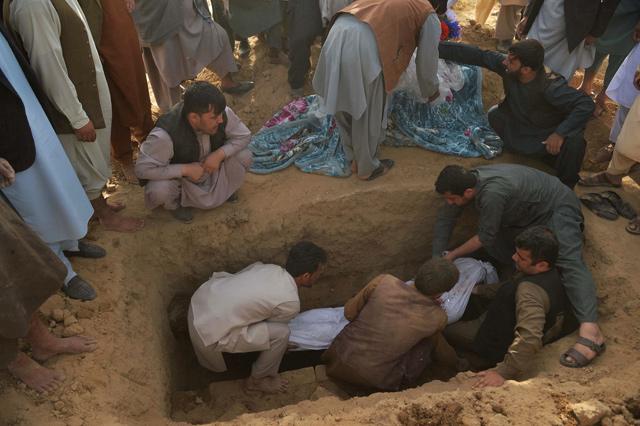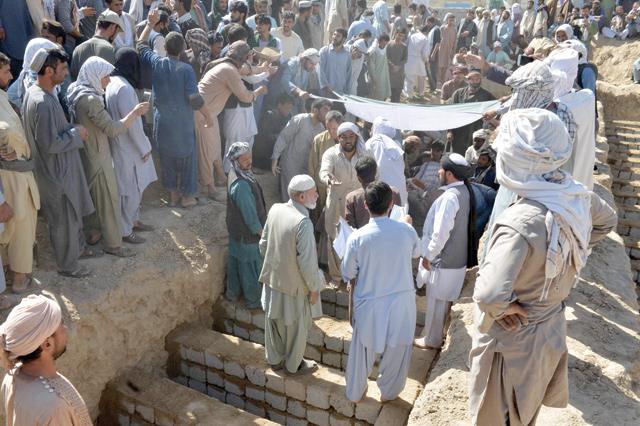You are here
Afghan Shiites bury dead as bombing toll passes 60
By AFP - Oct 09,2021 - Last updated at Oct 09,2021

Relatives lower into a grave the body of a victim of Friday's suicide bomb attack on worshippers at a Shiite mosque, during the funeral at a graveyard in Kunduz on Saturday (AFP photo)
KUNDUZ, Afghanistan — Mourners from Afghanistan's minority Shiite community buried their dead on Saturday after a suicide attack on a mosque killed more than 60 people, marking the bloodiest assault since US forces left the country in August.
A gravedigger in the Shiite cemetery overlooking the northern city of Kunduz told AFP they had handled 62 bodies, and local reports suggested the final toll could be up to 100.
Scores more victims were also wounded in Friday's blast, which was claimed by the Daesh terror group and appeared designed to further destabilise Afghanistan in the wake of the Taliban takeover.
The regional branch of the sectarian Daesh, known as Islamic State-Khorasan (IS-K), has repeatedly targeted Shiites in Afghanistan. It is a Sunni Islamist group like the Taliban, but the two are bitter rivals.
IS-K said the attack was carried out by a Uyghur Muslim suicide bomber who had “detonated an explosive vest amid a crowd” of Shiite worshippers.
The attack happened during Friday prayers — the most important of the week for Muslims — and residents of the city told AFP that hundreds of worshippers were inside.
In a heart-wrenching scene, relatives gathered around the newly-dug graves in Kunduz wailed inconsolably over their loved ones.
“We are really hurt by what happened,” Zemarai Mubarak Zada, 42, told AFP as he mourned his 17-year-old nephew, who he said had wanted to follow in his footsteps and become a doctor.
“He wanted to get married. He wanted to go to university,” he said.
‘Terrifying’
Images from the scene of the attack on Friday showed debris strewn inside the mosque, its windows blown out by the explosion. Some men were seen carrying a body draped in a bloody sheet to an ambulance.
“It was a very terrifying incident,” said a teacher in Kunduz, who lives near the mosque.
“Many of our neighbours have been killed and wounded. A 16-year-old neighbour was killed. They couldn’t find half of his body.”
Aminullah, an eyewitness whose brother was at the mosque, said: “After I heard the explosion, I called my brother but he did not pick up.”
“I walked towards the mosque and found my brother wounded and faint. We immediately took him to the MSF hospital.”
‘Horrific attack’
The Taliban’s efforts to consolidate power have been undermined by a series of deadly IS-K attacks.
The Taliban security chief in the northern city accused the mosque attackers of trying to foment trouble between Shiites and Sunnis.
“We assure our Shiite brothers that in the future, we will provide security for them and that such problems will not happen to them,” Mulawi Dost Muhammad said.
The attack was met with broad international condemnation, with UN chief Antonio Guterres calling for the perpetrators to be brought to justice.
Guterres “condemns in the strongest terms today’s horrific attack”, the third against a religious institution in Afghanistan in a week, his spokesman said.
Viewed as heretics by Sunni extremists such as Daesh, Shiite Muslims have suffered some of Afghanistan’s most violent assaults, with rallies bombed, hospitals targeted and commuters ambushed.
Shiites make up about 20 per cent of the Afghan population. Many of them are Hazara, an ethnic group that has been persecuted for decades.
In October 2017, an Daesh suicide attacker struck a Shiite mosque in the west of Kabul, killing 56 people and wounding 55.
And in May this year, a series of bombings outside a school in the capital killed at least 85 people, mostly young girls. More than 300 were wounded in this attack on the Hazara community.
US-Taliban talks
Michael Kugelman, a South Asia expert at the Woodrow Wilson International Centre for Scholars, told AFP the Taliban would find it difficult to consolidate power unless they tackle terrorism and the growing economic crisis.
“If the Taliban, as is likely, is unable to address these concerns, it will struggle to gain domestic legitimacy and we could see the emergence of a new armed resistance,” he said.
The United States was meanwhile holding its first face-to-face with the Taliban since its troops withdrew, at a meeting in Doha on Saturday.
The US delegation would press the Taliban to ensure terrorists do not create a base for attacks in the country, a State Department official said.
It was also pressuring Afghanistan’s new rulers to form an inclusive government and to respect the rights of women and girls, the official said, stressing the meeting did not indicate Washington recognised Taliban rule.
“We remain clear that any legitimacy must be earned through the Taliban’s own actions,” the official said.
The Taliban are seeking international recognition, as well as assistance to avoid a humanitarian disaster and ease Afghanistan’s economic crisis.
Related Articles
KABUL — At least 16 people were killed in two Afghan cities on Thursday by bomb blasts that were claimed by the Daesh..Since Taliban fighter
KANDAHAR, Afghanistan — Afghanistan's Shiite minority buried their dead for the second Saturday in a row after another suicide bomb attack o
KANDAHAR, Afghanistan — The Daesh terror group, which has been building a presence in Afghanistan for more than a year, has established a re














